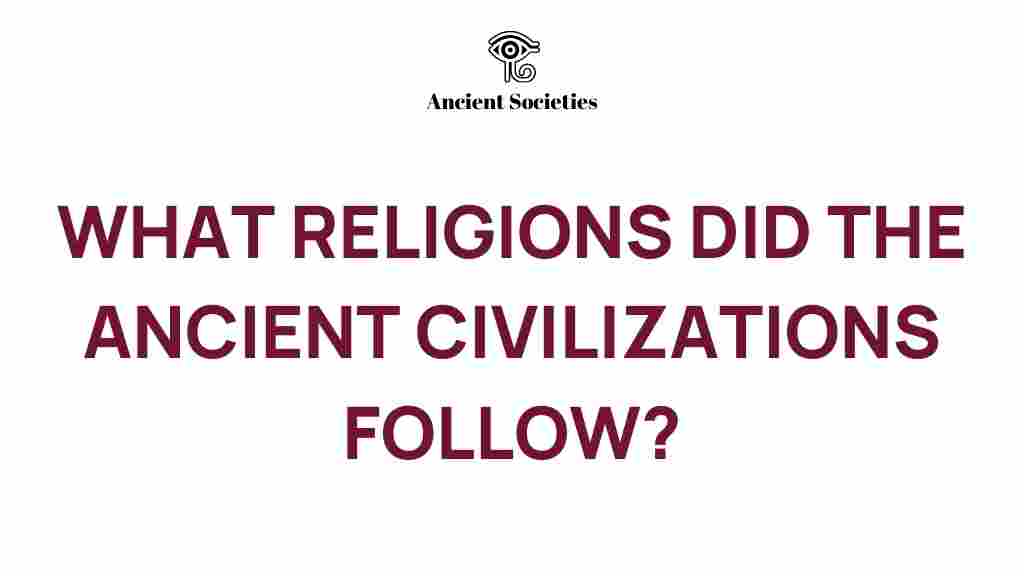Unveiling the Sacred: Religions of Ancient Civilizations
The study of ancient civilizations reveals a rich tapestry of religions, cultures, and belief systems that shaped the spiritual lives of people long before the modern world emerged. These ancient societies, from the Egyptians to the Mesopotamians, left behind a legacy of mythology, rituals, and profound spirituality that continues to intrigue historians, archaeologists, and curious minds alike. In this article, we will explore the diverse religions of ancient civilizations, examining their connections to culture, history, and the human experience.
The Interconnection of Religion and Culture
Religion in ancient civilizations was not merely a set of beliefs; it was a way of life that influenced every aspect of society. The intertwining of religions and culture can be observed through:
- Art and Architecture: Sacred spaces like temples and pyramids were constructed to honor deities.
- Literature: Myths and epics were written to convey moral lessons and explain natural phenomena.
- Social Structure: Priests often held significant power, influencing politics and social organization.
Understanding the religions of these ancient civilizations allows us to grasp the complexities of their cultures and the ways in which they sought to understand their world.
Major Religions of Ancient Civilizations
Let’s delve into some of the major religions that shaped ancient civilizations:
1. Ancient Egyptian Religion
The ancient Egyptians believed in a pantheon of gods and goddesses, each representing different aspects of life and nature. Key features included:
- Polytheism: Worship of many deities such as Ra, Osiris, and Isis.
- Afterlife Beliefs: The concept of Ma’at, which emphasized truth and justice, was crucial for the afterlife.
- Rituals: Elaborate burial practices, including mummification, were performed to honor the dead.
2. Mesopotamian Religions
Mesopotamian civilizations, such as the Sumerians, Akkadians, Babylonians, and Assyrians, had rich religious traditions:
- Gods of Nature: Deities like Anu (sky) and Enlil (wind) influenced agricultural practices.
- Ziggurats: These pyramid-like structures served as temples for worship.
- Epic Literature: The Epic of Gilgamesh reflects their understanding of divinity and mortality.
3. Ancient Greek Religion
The Greeks worshiped a multitude of gods who personified various elements of life:
- Mythology: Stories of gods like Zeus, Athena, and Poseidon were integral to Greek culture.
- Rituals: Festivals such as the Olympics honored the gods and fostered community.
- Philosophy: Thinkers like Socrates and Plato explored spirituality beyond traditional beliefs.
4. Ancient Indian Religions
In the Indian subcontinent, the roots of Hinduism, Buddhism, and Jainism emerged:
- Dharma: The moral law that governs individual conduct and societal order.
- Karma: The belief in the cause and effect of actions influencing future lives.
- Rituals: Practices like puja (worship) and meditation are still prevalent today.
5. Indigenous and Tribal Religions
Many ancient civilizations also included indigenous belief systems that were deeply tied to nature:
- Animism: The belief that spirits inhabit natural objects and phenomena.
- Rituals: Ceremony and celebration of seasonal changes and agricultural cycles.
- Oral Traditions: Stories passed down generations to convey spiritual teachings and cultural values.
Archaeological Insights into Ancient Religions
Archaeology plays a crucial role in uncovering the religions of ancient civilizations. Excavations of temples, tombs, and artifacts provide valuable insights into their spirituality and belief systems. Some key archaeological findings include:
- Pyramids of Giza: Reflect the Egyptians’ focus on the afterlife and divine kingship.
- The Code of Hammurabi: An ancient Babylonian law code inscribed with divine authority.
- Petra in Jordan: The Nabateans’ temple complex highlights their syncretism with other cultures.
These findings illustrate how the religions of ancient civilizations were not only a matter of faith but were also interwoven with everyday life and governance.
Rituals and Practices that Defined Spirituality
Rituals are a fundamental part of any religion. They serve as a means of connecting with the divine and expressing cultural identity. Some common types of rituals found in ancient civilizations include:
- Sacrifices: Offerings made to gods to seek favor or appease them.
- Festivals: Celebrations that mark important religious events or seasonal changes.
- Pilgrimages: Journeys to sacred sites that hold religious significance.
These rituals were often tied to the agricultural calendar and the changing seasons, emphasizing the relationship between mankind and nature.
The Evolution of Belief Systems
Over time, the religions of ancient civilizations evolved, leading to the emergence of new belief systems. This evolution was influenced by:
- Cultural Exchange: Trade routes facilitated the spread of ideas and practices between civilizations.
- Conquests: Empires imposed their religions on conquered peoples, leading to syncretism.
- Philosophical Developments: Thinkers challenged traditional beliefs, leading to reforms and new interpretations.
These factors contributed to the dynamic nature of spirituality and the ways in which people understood their place in the universe.
Challenges in Understanding Ancient Religions
While studying ancient religions, scholars face several challenges:
- Limited Written Records: Many ancient cultures did not leave behind extensive texts.
- Interpretation of Artifacts: Understanding the context and meaning of archaeological finds can be contentious.
- Modern Biases: Contemporary views can influence the interpretation of ancient beliefs.
Despite these challenges, ongoing research in archaeology and comparative religion continues to shed light on the cultures and spirituality of ancient civilizations.
Conclusion: The Legacy of Ancient Religions
The religions of ancient civilizations offer profound insights into the human experience, shaping not only the cultures of their time but also influencing modern spiritual practices and belief systems. By studying these ancient cultures, we gain a deeper understanding of our shared history and the diverse ways humans have sought to connect with the divine.
As we continue to explore the history of ancient civilizations through archaeology and scholarship, the sacred stories and rituals of our ancestors remind us of the timeless quest for meaning and connection in an ever-changing world. For further reading on the impact of ancient religions on modern practices, check out this resource.
To learn more about the fascinating discoveries in archaeology, visit this link.
This article is in the category Culture and created by AncientSocieties Team
